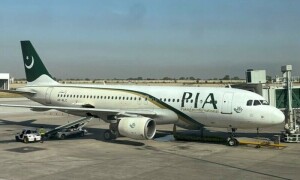UAE, China promise Pakistan $1.3b to get IMF deal on track
Pakistan announced financial support Friday from the United Arab Emirates and China totalling $1.3 billion, giving the ailing economy a shot in the arm as it seeks to meet conditions for the resumption of an International Monetary Fund bailout.
Finance Minister Ishaq Dar said the UAE had promised a billion dollars to prop up Pakistan’s forex reserves – which at their current level of $4.04 billion can barely pay for four weeks of imports.
The commitment is one of the IMF’s last requirements before approving a staff-level pact to release a tranche of $1.1 billion, delayed for months, that is crucial for Pakistan to resolve an acute balance of payments crisis.
China on Friday released $300 million to Pakistan – the last tranche of a $1.3 billion rollover loan, Dar said.
“UAE authorities have confirmed to IMF for their bilateral support of US$ one billion to Pakistan,” Dar tweeted.
He added that the country’s central bank was preparing the documentation to receive the deposit.
The pledge makes the UAE the third country, after Saudi Arabia and longtime ally China, to come to Pakistan’s assistance, as external financing is needed to fully fund the balance of payments gap for the fiscal year that ends in June.
“The UAE deal should be helpful because the IMF has been saying Pakistan should secure financing from ‘friendly’ nations,” said Seaport Global EM credit analyst Himanshu Porwal.
“It is still far from over though. The IMF is saying that they [Pakistan] are in breach of certain targets. The fiscal deficit for example is seen peaking at around 8.3% (of GDP), so almost double what they were expecting,” he added.
Pakistan signed a $6.5 billion bailout package with the IMF in 2019, but has repeatedly reneged on conditions and so far just $3 billion has been released.
The IMF insists the nuclear-armed nation of 220 million people must boost its pitifully low tax base, end tax exemptions for the export sector, and raise artificially low petrol, electricity and gas prices meant to help low-income families.
The country’s hopes for another round of IMF funding also depend on friendly countries rolling over existing loans or providing additional support.
Faisal Shaji, chief strategy officer at Standard Capital Securities, said it appeared the latest funding would put Pakistan back “on (the) IMF-laid track”.
“One must be optimistic of getting IMF funding resumption now,” he told AFP.
Pakistan’s economy has crumbled alongside a simmering political crisis, with the rupee plummeting and inflation at decades-high levels, while devastating floods and a major shortage of energy have piled on further pressures.
Year-on-year inflation hit 35.37 per cent in March – the highest in nearly five decades – while the average inflation rate for the past year was 27.26 per cent.
The South Asian nation’s enormous national debt – currently $274 billion, or nearly 90 per cent of gross domestic product – and the endless effort to service it makes Pakistan particularly vulnerable to economic shocks.
Pakistan’s bonds, which have slumped nearly 70% over the last year as the country’s troubles have mounted, climbed for a second day running on the confirmation. The rise was almost 5% for its bond with closest payment date - April 15 next year - taking it to almost 50 cents in the dollar, compared to 46 cents a few days ago.
On Thursday, the IMF’s managing director, Kristalina Georgieva, said the fund was also in talks with nations friendly to Pakistan to secure financial assurances vital for the programme.
Last week, Saudi Arabia also told the IMF it would provide financing of $2 billion to Pakistan.
Pakistan’s foreign exchange reserves have fallen to cover barely a month of imports after the IMF funding stalled in November, hit by snags over fiscal policy adjustments after officials of the lender visited Islamabad in February for talks.
Policy and fiscal measures
Pakistan had to complete actions demanded by the IMF, such as reversing subsidies in its power, export and farming sectors, hikes in the prices of energy and fuel, and a permanent power surcharge, among other measures.
These steps included jacking up its key policy rate to an all-time high of 21%, a market-based exchange rate, arranging for the external financing, and raising more than Rs170 billion ($613 million) in new taxes.
The fiscal adjustments have already fuelled Pakistan’s highest inflation ever, which climbed in March to more than 35% on the year.
A final issue to be resolved is a fuel pricing scheme meant to bring relief to Pakistan’s lower middle class and poor from crippling inflation. The IMF has asked how it will be funded.
The IMF programme will disburse another tranche of $1.4 billion to Pakistan before it concludes in June.
Funds from the lender will also unlock other bilateral and multilateral financings for the cash-strapped country.
Neighbouring China has rolled over $2 billion and refinanced another $1.3 billion in recent weeks.
Programme loans from other multilateral agencies await completion of the IMF review, central bank governor Jameel Ahmad told investors in Washington at the spring meetings of the lender and the World Bank.
Measures such as a hike of 1,400 basis points in interest rates over the last 18 months have put the nation of 220 million on a path to macroeconomic stability, added Ahmad, who hoped for inflation to start decelerating over the next few months.
The government is pursuing a contractionary fiscal policy, with the primary balance in surplus so far compared to a deficit last year, he added.
For the latest news, follow us on Twitter @Aaj_Urdu. We are also on Facebook, Instagram and YouTube.






















Comments are closed on this story.